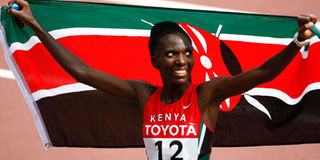Kenya must learn to repair its faults for it to be a great nation

Kenya's Catherine Ndereba poses with the Kenyan national flag after winning the women's marathon at the 11th IAAF World Athletics Championship in Osaka September 2, 2007. In Kenya we have great athletes who give us global visibility, great farmers who toil without government protectionism, and great teachers and other professionals who do great work that is often diminished by the State. PHOTO | FILE
What you need to know:
- What distinguishes Kenya from most other states is our inexplicable tolerance for dangerous and recurrent faults.
- Kenya has two gangrenous wounds that have been allowed to fester: Tribalism and corruption.
Our dalliance with them shows that our state has an undeclared death wish.
One of the most incisive observers ever to document American society was a French public official by the name Alexis de Tocqueville.
After visiting America to study its prisons, he wrote a book, Democracy in America, detailing his impressions of the new world.
In it, he made the following observation: “The greatness of America lies not in being more enlightened than any other nation, but rather in her ability to repair her faults.”
It is a point worth underlining – that the greatness of a nation lies not in its “enlightenment”, that is, its technology, physical development and even the education of its people, however important those be, but in the ability of the nation to self-correct.
AMENDMENTS
For the large part, that is what America excels in, as the various amendments to its constitution disaster reports show. Whenever a catastrophe, or social upheaval, threatens or occurs, it is fully studied and corrected.
Undoubtedly, Kenya has a lot going for it. In fact, Kenya is more blessed, in many ways, than most other nations.
The country has hardworking and commercially aggressive people, a large percentage of who are educated.
A good climate, albeit one we are slowly ruining with wanton deforestation without concomitant replacement of trees, is a boon.
HANDICAP
Compared to other African countries, we have good infrastructure – shiny new roads, railways, harbours, internet and power lines.
We have great athletes who give us global visibility, great farmers who toil without government protectionism, and great teachers and other professionals who do great work that is often diminished by the state.
But even the best of a bad lot is still bad. For all our various endowments and blessings as a nation, our biggest problem is our debilitating handicap for repairing our faults.
There is no nation in the world without its own unique challenges. What distinguishes Kenya from most other states is our inexplicable tolerance for dangerous and recurrent faults.
Kenya has two gangrenous wounds that have been allowed to fester: Tribalism and corruption. Our dalliance with them shows that our state has an undeclared death wish.
PSYCHOACTIVE
It is as if we took a hypodermic needle and injected our national body with the psychoactive concoction of tribalism and corruption, which now courses through our veins like a deranged hormone, permeating every nook and cranny of our society.
Every day, we ogle at our street children without realising that they are the living simulacra of our nation, that the Kenyan nation now shares an uncanny resemblance to the vagabonds on its streets. While the street children inhale glue to fuel their miserable lives, our nation fuels itself on the narcotics of corruption and tribalism.
Its mind already altered, mood affected and energy level behaving like a yoyo, our nation walks around with a dirty bottle of the toxic tribalism and corruption inhalant hanging from its lip as it scavenges for crams and bits of chicken bones from the dumpsite of life.
INHIBITION
We could have achieved remarkable development but these drugs have impaired our nation’s motor functioning, and interfered with both our decision-making and problem-solving abilities.
They have also severely reduced the nation’s inhibition. If something is not done quickly, our nation may lose control of its bodily functions, walk around naked, while stinking to the high heavens. It is obvious that this nation needs to see a shrink, who should do it a favour and send it straight to rehab – the desirable destination for a nation that can’t solve its addictions.
Yet it would be very easy to solve the problems of tribalism and corruption. Unfortunately, there is every indication that we are not willing to kick the habit.
As they say in psychology, the journey to recovery starts with acceptance. All of us, including our leaders, have yet to accept that tribalism and corruption are our biggest problems. We are yet to elevate these faults to national disasters, which is necessary in order to tackle them head on. For we can’t attain our well thought-out nation goals while afflicted by this addiction.
CATWALKS
The way we deal with these two dangerous faults is a study in disinterest. Whenever the vices come into the open, we hurriedly arrange a coming out carnival, a huge, televised spectacle complete with catwalks, cheerleading, and catcalls.
Then we go overboard with nice political speeches, stage-managed arrests, public arraignments, mash-up videos, memes and rib-cracking internet jokes that we pass around the bonfire of the social media.
SKIRMISHES
In the end, the suspects and culprits, in a familiar cleansing ritual, go through the revolving doors at Integrity House or the courts and emerge the other side, clean as a whistle. By this time, our outrage has died down and we are all living like brothers and sisters while waiting for the next scam, and for the ultimate pogrom to end the mini-pogroms often euphemistically referred to as “skirmishes”, “tribal clashes” and “post-election violence.”
For Kenya to be a great nation, let us learn to repair our faults.
Dr Ngugi teaches at the School of Journalism at UoN; [email protected]





